Enkidukai

|
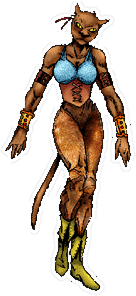
| |
| A male and female Enkidukai | ||
Physical Traits
Humanoids with feline features, the Enkidukai are smaller than humans. Their bodies are covered in short hair rather like fur, which is either striped, spotted, dark or uniform. Their legs are similar in shape to the ones of a feline, and they have paws instead of feet. Their arms are long and lean; their hands sometimes have claws. They are organized in packs: the Rabani, Clamod, Sarraghi, Blikau, Kore, and Akkaio. Their main city is Ojaveda.
Height: 1.60 m to 1.70 m tall
Eyes: They have small, slitted eyes. Their vision is one of their most evolved senses, allowing for vision in darkness.
Hair: Their head is covered by short fur like the rest of their body.
Life Expectancy: on average 60 years.
Gestation Period: 4 months.
Starting stats: Strength 55, Endurance 50, Agility 85, Intelligence 40, Will 70, Charisma 50.
Abilities and Fields of Interest
- Acute senses: They possess extraordinarily acute senses, and excellent reflexes. Given the hard training and the constant competition of survival, all the Enkidukai are good warriors and valuable companions in battle. Fairly hardy in constitution, they have a deep determination and strong will.
- Martial arts: One aspect of the culture that is continually evolving is a martial arts form known as Kehaghaar-merrah, or 'the balanced flow'. The nature of this art is to find the centre of gravity for the body, to take it and move it in order to be out of balance, then to flow back in. A combination of allowing others to use their own energy to help you, (edarhe) and to use your own energy to help others (edarma) and to use your own energy to defend and attack as needed (umarde), it is a balanced form. To use references from Earth cultures, it is similar to Aikido, but incorporating other attack and defensive forms as needed. Most of the point of the art form is its fluidity, finding the most stable position, and this art form is typical of the entire culture of the Enkidukai.
Language
Main article: Enkidukai Language
Enkidukai or Enkien is the native language spoken by the race of Enkidukai in Yliakum.
Behaviour, Social Structure and Customs
The Enkidukai live in packs, led by the strongest and most skilful male. This makes them suspicious and careful around strangers, but when they begin trusting you, they are faithful companions. Ojaveda is their Capital City and home of the Enkidukai race. Not all Enkidukai live within the walls of Ojaveda but it is the place to find each of the six main packs. These six packs are the Rabani, Clamod, Sarraghi, Blikau, Kore, and Akkaio. Each pack has a typical and easily recognizable look, partly because of their habit of cutting or colouring fur in ritual or traditional ways along with their natural colourings.
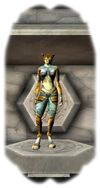 |
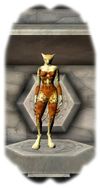 |
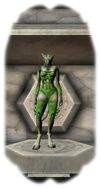 |
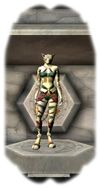 |
 |
|
| Akkaio | Blikau | Clamod | Kore | Rabani | Sarraghi |
|---|---|---|---|---|---|
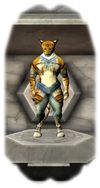 |
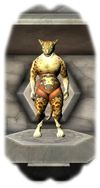 |
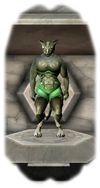 |
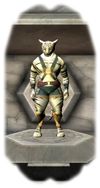 |
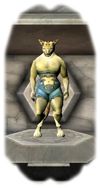 |
The Enkidukai believe a failed hunt is a bad omen, brought up through time from the days when a failed hunt could mean the end of a tribe. Thus, Enkidukai will pursue a hunt to its end, or to their death, whichever comes first. Enkidukai are considered of age when they complete their first hunt, usually at age ten. They have a ritual of blooding, drinking the blood of the slain beast, and eating the flesh. Through this act it is believed that the spirit of the beast is conferred to the new adult. Despite the importance of this ritual, it is generally a rather simple affair, done at the time of the kill. Within some packs however, it is customary for a grander, symbolic hunt to be re-enacted where the young man or woman is symbolically re-blooded so the rest of the pack can share his or her advancement to adulthood. Adulthood may also be recognized under certain circumstances where a great beast was slain to defend others.
The Enkidukai believe that children are the future, they keep their children safe even to the extent of sacrificing themselves. They consider the highest crimes to be those against children, and the children's enclave is always in the centre of their settlements, usually fairly well fortified and guarded. Enkidukai children tend to be well loved, and know that they are so.
The history-keepers use a vocal tradition that dates back before the entry into the portal gates. They are known as Graalahkam-maarhe, or the memory singers. They are considered to be among the most important members of the tribe, and often in the past a tribe would be disbanded when all the memory singers died.
The Enkidukai have a culture that detests waste, in everything. Metals are kept and recycled, bone is reworked into other things, sinew into rope and bindings, fur into dyed and colored fabric for trade. The Enkidukai believe in cultural stasis, but are far too cunning and adaptable to make it permanent. They adopt aspects of certain cultures that they believe are good, often sending out scouts to see what others are doing so they might emulate it. There is a long-term testing period associated with any given incorporation, at which point it is rejected or accepted by the elders of the given clan. Of the clans, there are many different rates of acceptance and change, and as with any culture, some that would be just as happy should they be living out and hunting again as their forefathers did, with no change at all.
Nutrition
The Enkidukai are very fond of fresh meat, red meat in particular, but they will settle for fish. There are also one or two varieties of fish that are preferred above the others. Enkidukai are good farmers despite their preference for meat. They believe that to eat the flesh of your first kill, raw, is to take the power of the beast within you, to fuel your inner energy.